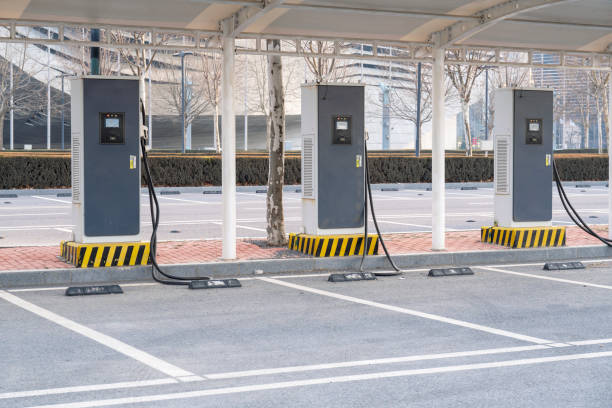
Should electric car charging be a workplace right?
Workplace electric vehicle charging is fast becoming a perk offered by employers across the globe. It is no wonder, given that electric vehicles are set to increasingly replace traditional gasoline cars over the next decade.
There are now 20 million electric vehicles on the world’s roads. By 2030, that figure is projected to soar to 130 million. Around the world, 30 national government have vowed to phase out traditional gasoline cars by 2035. As the number of electric vehicles on our roads increase, the issue of workplace charging will take centre stage. It will no longer be considered a perk, but a workplace right.
The argument for workplace charging as a right
One of the downsides of electric vehicles is that not only are charging stations in Australia few and far between. But also, the range that an electric vehicle can drive on a single recharge is limited. A long commute, like that to work, could seriously drain the battery. As more employees transition to electric vehicles, many will demand that they have the right to charge at work. This right would entail not only having a charging station easily accessible. It could also entail charging for free, or at least, at a subsidised rate.
There are countless compelling arguments for making workplace charging a right. Not least among these is that Australia is severely lagging behind the rest of the world in the uptake of electric vehicles. And not only that, we lack the infrastructure to enable this uptake. The Australian government has not yet committed to phasing out internal combustion cars. This despite its pledge to achieve net zero carbon emissions by 2050.
As part of this pledge, the government is aiming to reach emission levels 43 per cent below 2005 levels. A dramatic change to the way Australians consume fossil fuels will be needed. Making workplace charging a right could be the most powerful policy to expedite the transition to electric vehicles, and therefore reducing emissions.

Australian electric vehicle sales have grown, but lag behind rest of world
Statistics from the Electric Vehicle Council reveal that in 2021, there were 21,000 electric vehicles sold in Australia. This figure almost doubled in 2022, with 40,000 electric vehicles sold. Last year, Electric vehicles accounted for 3.8 per cent of all new motor vehicle sales. And so far up to September this year, in 2023 electric vehicles have made up 7.2 per cent of all car sales. The number of electric vehicles on Australian roads has now passed the 100,000 mark.
Despite Australian electric vehicle sales soaring, we are still lagging far behind the rest of the world. Between 2017 and 2022, global electric vehicle sales grew from approximately 1 million to over 10 million. In 2022, 95 per cent of all electric vehicle sales were in China, Europe and the United States. There are now 20 million electric vehicles on the world’s roads. By 2030, that figure is projected to soar to 130 million.
While many may think that Tesla is synonymous with electric vehicles, Chinese car maker BYD leads the way in sales. In 2022, the company overtook Tesla to make up 45 per cent of all electric vehicle sales globally. Not only is Australia’s transition to electric vehicles lagging behind the rest of the world, so too are its policies for encouraging that transition.

ACT vows to phase out gasoline cars by 2035
While the Australian federal government has not officially pledged to phase out internal combustion cars, the Australian Capital Territory has. It became the nation’s first state or territory government to pledge to this mission. The ACT has vowed to end the sale of petrol and diesel cars by 2035. And it aims to ensure 80 to 90 per cent of all cars sold to be electric or hydrogen powered before 2030.
The federal government may soon join this pledge to phase out gasoline cars. In April 2023, it released its first electric vehicle strategy. The strategy aims to make electric vehicles more affordable and expand the choice of electric vehicles on the market. It also aims to increase the number of electric vehicles charging stations across the country.
As part of the strategy, the government also plans to introduce a fuel efficiency standard. This would obligate car manufacturers to satisfy emissions limits for their entire fleet of vehicles. The aim is that the emissions limit would encourage manufacturers to sell more electric vehicles. Across Europe, national governments are offering a range of financial support and tax incentives to employers willing to invest in workplace charging stations. Here we highlight some of the most progressive policies introduced:

The UK has introduced a workplace charging scheme
While workplace charging has not become a legal right in the United Kingdom, the nation has taken significant steps to promote electric vehicle adoption. One such initiative is the Workplace Charging Scheme, introduced by the United Kingdom government in 2016.
The scheme encourages all businesses to invest in electric car charging infrastructure. It provides financial support to businesses for the installation of electric vehicle charging stations at their premises. It offers employers up to 75 per cent off the overall purchase and installation costs for each charging station. Since its inception, the Workplace Charging Scheme has gained traction and witnessed substantial growth. As of 1 April 2022, the scheme has funded the installation of 13,396 sockets in workplace car parks since its launch in 2016.
Sweden provides tax-free workplace charging
In Sweden, the government announced a tax exemption for workers who take advantage of workplace charging. As of 1 July 2023, employees in Sweden do not have to pay tax on the electricity they purchase to charge their electric vehicle. The exemption applies to workplace charging all companies regardless of size or industry. Charging must take place at a point provided by the employer at the workplace.
The tax exemption, however, will be repealed on 30 June 2026.The removal of taxes on workplace electric vehicle charging is anticipated to stimulate growth in charging infrastructure. Property owners and companies will be incentivised to install charging stations, as the demand for workplace charging is poised to soar. Consequently, employees will enjoy the convenience of charging their electric vehicles while at work, ensuring they have ample range for their daily commutes.
The Netherlands mandates workplace charging stations
The government of the Netherlands has passed laws that make it mandatory for certain commercial buildings to have electric vehicle charging stations. This applies to new commercial buildings with more than 10 car spots. They are required to have at least one workplace charging station. From 2025, mandatory charging stations will apply to all commercial buildings. They will be required to have at least one workplace charging station.

The environmental argument for workplace electric vehicle charging
The rise of electric vehicles is not just a technological trend; it’s a global necessity. With the looming threat of climate change and the need to reduce greenhouse gas emissions, transitioning to electric vehicles has become paramount. Electric vehicles are more energy-efficient and produce zero tailpipe emissions. They can also significantly reduce our dependence on fossil fuels. Encouraging their adoption is not just about individual choice; it’s a collective responsibility.
Workplace charging encourages more employees to drive electric, leading to fewer emissions from combustion engine vehicles. This can make a substantial contribution to improving air quality and mitigating climate change. Charging electric vehicles at workplaces can also optimise energy usage. It allows companies to leverage renewable energy sources, such as solar panels, to charge vehicles during daylight hours, reducing grid stress during peak times.
Workplace charging can also be in the business interests of employers. In recent years, the global business landscape has witnessed a significant shift towards greater corporate responsibility. Environmental, Social, and Governance (ESG) considerations have moved from the periphery to the core of business strategies and operations.
Factors such as reducing carbon emissions, conserving water resources and protecting biodiversity are all paramount. Companies are expected to adopt sustainable practices and actively contribute to mitigating climate change. This often includes setting clear targets for emissions reductions and adopting renewable energy sources. Workplace charging could form a key way for companies to boost their ESG credentials.
Benefits of workplace charging for employees
There are of course many benefits of workplace charging for employees. Charging an electric vehicle at work reduces the need for employees to invest in expensive home charging solutions. It lowers the total cost of ownership, making electric vehicles more affordable and accessible.
Knowing that a workplace charging solution is available can alleviate range anxiety, a common concern among potential electric vehicles buyers. This reassurance can encourage more employees to make the switch to electric.

Some workplaces already provide free workplace charging
As the number of electric vehicle owners increases, there will only be growing support for the idea of workplace charging. While workplace charging may not yet be offered by many Australian employers, it is already offered by some overseas. A Reddit post from an American worker highlights the benefits of free workplace charging.
“Free charging actually makes me want to commute to the office,” the worker wrote in the post. He details how his employer installed “12 free 50kw chargers for electric vehicles” at his workplace. While the worker was previously working “100% remote,” the incentive of free workplace charging was enough to not only get him back in the office. But also, to take on his daily commute of “25 miles (40 kilometres) each way though with heavy Seattle traffic.”
“I got to work with about 50% charge and left work at 80% (what I have my charging limit set to),” the worker said about his first day of the free workplace charging. He said that if he had to go back into the office full-time, “I’d never have to pay to charge my car.” To him, the workplace charging perk essentially means he gets “free gas for as long as I worked at that location.” “This is the one “perk” that actually will get me into the office every once and a while!” he wrote.
Why workplace charging should be a right
With electric vehicles poised to replace traditional gasoline cars in the coming years, the need for accessible charging options has never been more crucial. The argument for workplace charging as a fundamental right is compelling on multiple fronts. The environmental imperative cannot be overstated. Electric vehicles are a vital component of our collective responsibility to combat climate change.
At the moment, numerous state and territory governments offer financial incentives to companies that build charging stations. However, these policies are by no means as attractive as those in European nations. Government incentives to specifically encourage employers to install charging stations will significantly expedite Australia’s transition to electric vehicles.
But even more powerful would be new laws that ensure charging an electric vehicle at your workplace is a right. While such laws may seem a pipe dream at the moment, they will increasingly make sense as more and more people opt for electric vehicles.

Have your workplace rights been infringed?
Why workplace car charging should be a right will eventally effect us all. It will become one of the deciding factors for employees as to whether they work for a particular company or not. It may be considered a perk or a essential workplace tool. Time will tell. If you have suffered the injustice of an unfair dismissal, discrimination or a violation of your workplace rights, contact A Whole New Approach. (we are not lawyers). With a legacy spanning over 30 years, we’ve empowered over 16,000 individuals to pursue justice through the Fair Work Commission.
Our unwavering commitment to your cause is exemplified by our no-risk, no-fee service and a complimentary initial consultation. Time is of the essence – you have just 21 days from your dismissal to file an unfair dismissal claim with the Fair Work Commission.
Contact us today at 1800 333 666 for a confidential discussion about your situation.






